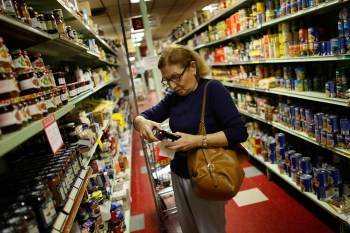The mafia’s effect on the economy
TEXT OF INTERVIEW
KAI RYSSDAL: The FBI did what you can only call “a sweep” in New York this morning. The feds arrested 127 members of the families that control the mafia throughout New York, New Jersey and New England.
If the mob were a company — and in a way it kind of is — that would really affect the bottom line in an already weak economy. So we’ve called Greg Smith; he covers organized crime for the New York Daily News. Greg, welcome to the program.
GREG SMITH: I’m happy to be here.
RYSSDAL: Is there a way to figure out how big the mob economy is in the New York area?
SMITH: Yeah, it’s difficult to quantify because these guys don’t really file 10-Q statements with the FTC. However, there are certain aspects of the mafia that are extremely predictable. One of them is their infiltration of unions. That’s always been their big money maker because when they can control a union, they can extort a lot of money out of big business and that is the thing that goes up and down with the economy for them. They always have their other scams as well, but that’s the big money maker for them.
RYSSDAL: The two industries that were mentioned a lot in news reports of the arrests this morning were construction and then the New York City waterfront.
SMITH: There were three unions that were implicated in today’s massive arrest. The waterfront union, which is I guess not terribly surprising. The mafia has been involved in the New York-New Jersey waterfront forever. Today’s indictment basically goes after the New Jersey side. Then there’s the concrete workers union, another non-surprise because they’ve been involved in the construction industry also forever. And then the other one is the Teamsters.
RYSSDAL: The recession, obviously, has affected the entire economy. Can you figure out how the recession has treated the mob?
SMITH: They react the way everybody reacts to the economy. If the money isn’t coming in from one place, they go try to find it somewhere else. One of the things that I saw recently was they showed in these mortgage frauds schemes that are kind of a reaction to the collapse of the housing market. So while they made some good money during the housing run-up by controlling, for example, construction unions, also controlling certain corrupt contractors that were making a lot of money when the housing market was on the way up. When the thing collapsed, they then switched over and got into mortgage fraud, which is also apparently quite a lucrative way of making money.
RYSSDAL: Yeah, that’s a fact. The mob, obviously, is cyclical — some families are up, some are down, business is good, business is bad. Is there any reason to think that this is some kind of nail in the coffin?
SMITH: No. I mean, the mafia in America — and specifically in New York — has been pronounced dead repeatedly. But these guys are really resilient, they just find new ways to get money no matter what the status of the economy is, no matter what the status of the FBI is, they are always around.
RYSSDAL: Greg Smith is a reporter at the New York Daily News. His new book is called “Nothing But Money: How the Mob Infiltrated Wall Street.” Greg, thanks a lot.
SMITH: No problem. Thank you.
RYSSDAL: You can see how much you know about the business of the mob.
Take our news quiz.
There’s a lot happening in the world. Through it all, Marketplace is here for you.
You rely on Marketplace to break down the world’s events and tell you how it affects you in a fact-based, approachable way. We rely on your financial support to keep making that possible.
Your donation today powers the independent journalism that you rely on. For just $5/month, you can help sustain Marketplace so we can keep reporting on the things that matter to you.


















